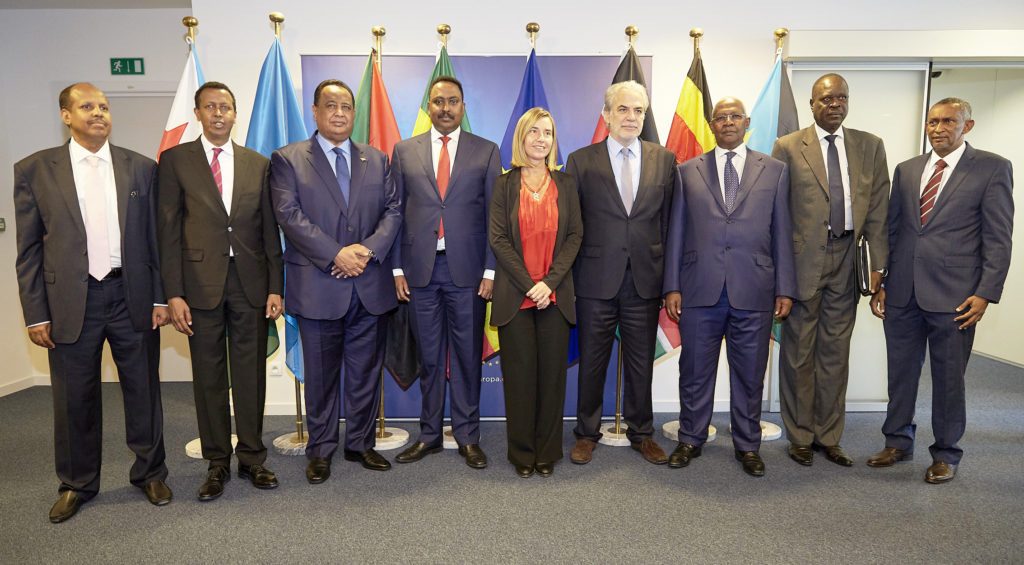The EU and IGAD held an informal ministerial meeting in Brussels on Friday last week (September 29). Those attending included Federica Mogherini, High Representative of the European Union for Foreign Affairs and Security Policy and Vice-President of the European Commission, Christos Stylianides, Commissioner for Humanitarian Aid and Crisis Management and the Foreign Ministers of the IGAD member countries. Ambassador Mahboub Maalim, Executive Secretary of IGAD, was also present. This was the second informal ministerial meeting between the HR/VP and the Foreign Ministers from Djibouti, Ethiopia, Kenya, Somalia, South Sudan, Sudan and Uganda. They also met earlier in the year on the margins of the African Union Summit in Addis Ababa.
This informal ministerial meeting focused on the multiple challenges affecting the security, stability and prosperity of the Horn of Africa ranging from prolonged conflicts and transnational crime to undocumented migration and deprived economic development. High on the agenda were the crisis in South Sudan, the problem of Somali refugees in Kenya, the issue of irregular immigration, human trafficking, development projects and cooperation between the EU and IGAD. In a press statement after the meeting, the High Representative and Vice-President reiterated the “EU’s continued engagement and support to the security and stability of the Horn, through close political ties and the EU’s substantial cooperation and security commitments, including through its EUCAP Somalia and ATALANTA missions”.

Both sides agreed to underpin collaboration on maritime security, transnational crime and border management in full respect of the rule of law and the protection of human rights. They also exchanged views on concrete avenues for cooperation on cross border trade and investment through EU instruments and programs, notably the new EU External Investment Plan, launched a day earlier.
The European Union welcomed the decision of IGAD’s June summit to revitalize the peace process in South Sudan. It commended IGAD’s important initiatives to manage the reconciliation processes in Somalia and South Sudan. At the same time, the High Representative and Vice-President emphasized the need for closer regional cooperation in the face of common trans-boundary challenges. Both sides agreed on the critical importance of Somalia’s security and state building progress for the stability of the region. Highlighting the need for a fairer burden sharing of the International Community and for a gradual ownership by the region, the European Union reiterated its support for the AMISOM mission in Somalia
In the specific discussions on the humanitarian situation in the Horn, Commissioner Stylianides welcomed the solidarity shown by several countries in the Horn hosting millions of refugees from various places. To ensure an effective and timely assistance and avoid further sufferings, both sides agreed on the importance of providing unrestricted humanitarian access to people in need and for Governments to recognize any occurring crisis without delay. Ms. Mogherini, the High Representative and Vice-President, also commended IGAD for holding its Special Summit on finding Durable Solutions for Somali Refugees, in March 2017, and for the commitment of the IGAD member states to collaborate across the region on the plight of refugees. In a session devoted to the Nairobi Plan of Action, there was general agreement to accelerate support to Somalia to create an environment conducive for returns and for refugees, who are not yet able to return, to integrate into the economic life of their host communities.
Lastly, both sides reaffirmed their readiness to ensure a substantial outcome to the upcoming AU-EU summit to be held in Ivory Coast, November 29-30. All the participants agreed the discussions had been productive and agreed to engage annually in this format. They also decided to set-up an appropriate Steering Group at senior official level. This will be tasked with developing a political framework for joint action and report back to the next Ministerial meeting.



